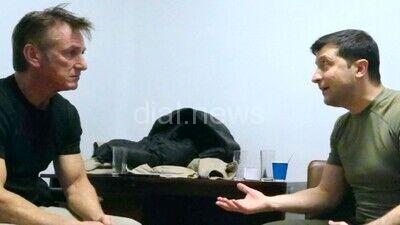That last film is by far the most interesting of the ones that Penn gives us in this grab-bag of a movie. And it’s a shame, because the few relatively brief sections of “Superpower” that scrutinize Zelensky as a self-created political icon (in the tradition of Ronald Reagan, Fred Dalton Thompson, and Donald Trump) are the most authoritative and fascinating by far.
Penn, an experienced actor and writer-director as well as troubled person whose violence made him a tabloid fixture, understands performance at every stage of the creative process. He also understands the media’s tendency to latch onto a catchy narrative and milk it, and many more things that non-famous people might only get theoretically. “Superpower” is at its best when letting Penn and co-director Aaron Kaufman put Penn’s spoken observations over clips pulled from early in Zelensky’s career, including talk and news show appearances, pieces of a presidential debate, and some innovative campaign ads and other material that play like pieces of a scripted television series or film by an auteur actor-director whose persona is so carefully crafted that he can afford to try out filmmaking experiments. (Zelensky even stages dynamic “walk and talks” like in a Hollywood movie, something that nobody can do well unless they’ve committed the lines to memory.)
Penn quotes Ronald Reagan and points out Zelensky’s use of comedy and music to engage viewers/voters. These parts of the movie are sharp enough that one wishes the entire project had concentrated on the idea of Zelensky as, essentially, an actor who wrote himself a scrappy underdog character who represented his own best fantasy of himself, played it so well that he won the presidency, then found himself having to play two more roles on top of it, wartime leader and national emblem, and nailed both.
The rest of the movie unfortunately wanders in and out of other modes. None are presented with as much relaxed authority. There’s a far less interesting shadow equivalent of the “Zelensky playing Zelensky” movie happening as well, in which Penn attempts to explain his obsession with traveling into danger zones to help people in trouble, using his fame and money to get into places ordinary people couldn’t go. Among other hotspots, he went into New Orleans during Hurricane Katrina and Haiti following the 2011 earthquake. Penn certainly had serendipity on his side: he had scheduled an interview with Zelensky that just happened to fall on the day before the invasion, and Zelensky kept it, and gave him more time on the actual day of the invasion as well. (Zelensky understands the value of using celebrity to carry a message as much as Penn does.)

